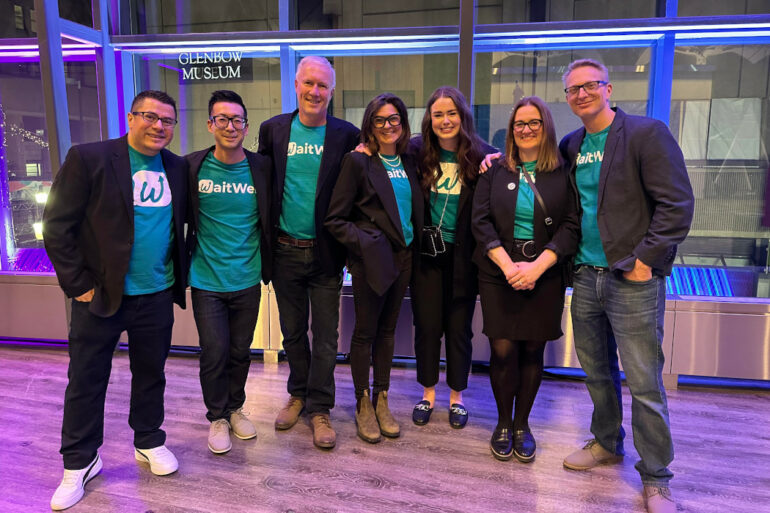Calgary-based WaitWell, which sells queue management and service-delivery software, has secured $1.5 million CAD in seed funding to expand its product and move into new markets.
WaitWell co-founders, CEO Steve Vander Meulen and CMO Shannon Vander Meulen, previously owned a motor vehicle registry in Alberta. When COVID-19 hit and public health restrictions were placed on essential services, it quickly became apparent that their customers needed a better waiting experience.
“We’re now ready to expand the business to other markets, including private health care and public services in the US.”
After examining the options available in the market and failing to find one that fit their needs, the husband-and-wife pair, who have a shared background in entrepreneurship, customer service, and tech, set out to build their own solution in June 2020 and launched WaitWell. To start, the two sold WaitWell to other motor vehicle registries across Alberta, but they soon learned that its potential applications extended to other types of businesses.
With its latest funding, WaitWell aims to bring more of them to its platform, which currently facilitates digital appointment booking, queuing, workflow, events, virtual meetings, and analytics. The startup wants to help clients provide a better experience to their customers, while also saving them time and stress by enabling smarter operational decisions.
WaitWell’s equity seed round, which closed this week, was co-led by Toronto-based Graphite Ventures and Edmonton’s Accelerate Fund III, with follow-on participation from Calgary-based Metiquity Ventures. Per Vander Meulen, it came at an $8-million pre-money valuation.
“Graphite is thrilled to work with Steve, Shannon, and the WaitWell team as they solve problems that have a huge impact on our daily lives,” Graphite principal Omi Velasco said in a statement. “We’ve been very impressed with WaitWell’s approach to digitizing service delivery workflow focusing on improving customer experience and reducing time to complete tasks.”
The latest financing brings WaitWell’s total funding to $2.5 million, a figure that includes $1 million in pre-seed capital from Metiquity, Startup TNT, and Be First Investments in 2022. Using that money, WaitWell focused on proving its postsecondary school-focused go-to-market strategy.
RELATED: Medimap raises $3.5 million to bring walk-in clinic wait-time tech to more medical practices
Since then, WaitWell has established a presence in higher education, where it helps replace physical lineups for service across campuses with virtual queues. The startup caters to a variety of university and college clients both north and south of the border, from McMaster University to the University of Texas, Simon Fraser University, and the University of Buffalo.
“We’re now ready to expand the business to other markets, including private health care and public services in the US,” Steve Vander Meulen told BetaKit in an interview.
Today, WaitWell serves nearly 400 locations across North America and recently crossed the 10 million user mark. In a statement, Accelerate Fund III investment analyst Melania Antoszko described the momentum that WaitWell has generated to date in traditional markets looking to adopt digital customer service as “incredible.”
Initially, Vander Meulen wondered if this demand for service optimization was fuelled by COVID-19.
RELATED: Graphite Ventures secures $10 million from AEC to continue Alberta investment commitment
“At first it was pandemic-related—people had to find alternatives, and we wondered if demand for our solution could take a bit of a downturn when the pandemic ended,” he said. “But it didn’t. It’s just growing even faster.”
While the startup also caters to other types of clients, including entertainment venues like museums and amusement parks, much of its focus to date has been on higher education. With its planned push into private health care—where waiting is common and tensions among patients can run high—Vander Meulen sees an acute need for WaitWell to serve another industry with an obvious pain point, where the stakes are bigger.
“The impact of the problem is greater in public services because we’re dealing with people’s health, we’re dealing with people’s ability to advance their education smoothly through change requests, program modifications, and the implication of having bad service is much greater than if you’re waiting in line for bowling,” Vander Meulen said.
On the product-development front, the startup plans to add payments and staff scheduling modules to its offering, all in service of its goal to help clients optimize service delivery and navigate staff shortages.
Feature image courtesy WaitWell.


